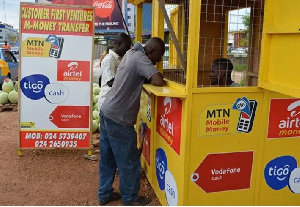 Mobile money transactions fell drastically when the idea of taxing mobile money was mooted
Mobile money transactions fell drastically when the idea of taxing mobile money was mooted
Policy Think Tank, Danquah Institute (DI), has waded in on the debate on the Electronic Transaction Levy (E-levy) saying the move will rack in revenue to propel development.
During a Press Conference in Accra on Wednesday, 24th November 2021, the Institute stated that if the government has projected to raise GH¢6.9 billion in 2022 from the E-levy when rolled out, then the levy could be said to be a novelty.
According to the Institute, in comparison with Import Duties and the amount of revenue the government would accrue from E-levy “then we can say the E-levy is a power tool for revenue generation.”
“Danquah Institute is of the firm belief that the E-levy is one of the best policies from the government. Because, despite the fact that the electronic transaction sector has not grown that much yet, it could do well during the heat of the COVID-19 pandemic. Clearly, it’s an area the government can have enough revenue to push development,” the Executive Director for DI, Dr. Antionette Tseboe-Darko told the media.
Dr. Tseboe-Darko also commended the government for making the levy pro-poor. “Exempting those whose daily transactions do not exceed GH¢100 (or GH¢3000 a month) and further suggests that further prospective taxpayers could be categorized into about 4 groups, each group being made to pay a different percentage in accordance with the amount transacted”.
The Institute advised the government to learn lessons from other African countries that attempted to or did introduce such levies. “In Uganda, it was realized that patronage of Mobile money transactions fell drastically when the idea of taxing mobile money transactions was mooted. In Tanzania, there is evidence to suggest that the idea to tax Mobile money transactions did not go well in terms of revenue generation. There is similar evidence in Kenya.”